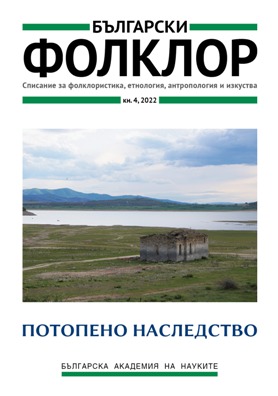„Нашите преместени гробища“: концепцията за гробище в наративите за принудително преселване
“Our Moved Cemeteries”: The Concept of a Cemetery in the Narratives about Forced Resettlement
Author(s): Iryna Koval-FuchyloSubject(s): Politics / Political Sciences, Politics, History, Anthropology, Social Sciences, Language studies, Language and Literature Studies, Economy, Cultural history, Museology & Heritage Studies, Semiotics / Semiology, Customs / Folklore, Geography, Regional studies, National Economy, Library and Information Science, Agriculture, Energy and Environmental Studies, Human Geography, Regional Geography, Historical Geography, Environmental Geography, Theoretical Linguistics, Applied Linguistics, Governance, Sociology, Economic history, Local History / Microhistory, Oral history, Social history, Recent History (1900 till today), Special Historiographies:, Theology and Religion, Lexis, Semantics, Pragmatics, Psycholinguistics, Sociolinguistics, Eastern Slavic Languages, Economic policy, Environmental and Energy policy, Cultural Anthropology / Ethnology, Culture and social structure , Social development, Human Ecology, Rural and urban sociology, Political Ecology, Sociology of Culture, Economic development, Post-War period (1950 - 1989), History of Communism, Migration Studies, Philology, Sociology of Politics, Socio-Economic Research, Sociology of Religion, History of Religion, Politics of History/Memory, Politics and Identity, Identity of Collectives, Stylistics
Published by: Институт за етнология и фолклористика с Етнографски музей при БАН
Keywords: forced resettlement; oral memories; cemetery; grave; cross
Summary/Abstract: In the narratives of migrants from submerged areas, four main concepts can be distinguished: home, land, church and cemetery. The article is devoted to the concept of a cemetery in the memories of forced resettlement from areas submerged during the construction of hydroelectric power plants in Ukraine. Excerpts from memories about the moving of cemeteries are presented. Folk beliefs, nominative vocabulary for events, places, characters, plots, persistent themes, and basic folklore plots are explored. The following main ideas are identified: it is not possible to move a cemetery entirely; disturbing the peace of the cemetery leads to dangerous consequences and provokes the wrath of the dead; the re-installation of grave crosses restores the sacredness of the graves, consolidates the resettled community and updates the memory of its historical past.
Journal: Български фолклор
- Issue Year: XLVIII/2022
- Issue No: 4
- Page Range: 513-524
- Page Count: 12
- Language: Bulgarian
- Content File-PDF

